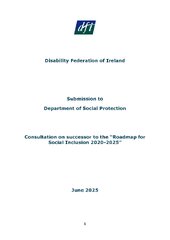DFI’s Submission to the Roadmap for Social Inclusion successor strategy consultation
Issued on July 15 2025
DFI made a submission on the successor strategy to the Roadmap for Social Inclusion 2020-2025.
The Roadmap for Social Inclusion has been an important strategy with key disability commitments which DSP has anchored since 2020, but many of which required cross-Departmental delivery and implementation. This has been an important positive in the strategy’s approach, but also a key implementation challenge given the busy period from 2020-2025.
Disability is an issue that by its very nature is impacted by policy areas covered by a range of different Departments, and thus requires strong and consistent cross-departmental coordination and policymaking. There is still a way to go to achieve this, and in this context we welcome both the forthcoming National Human Rights Strategy for Disabled People, but also this opportunity to reflect on the first Roadmap’s achievements, but also the learnings from challenges and failures that arose in its delivery.
DFI provides detailed feedback on the disability commitments in the Roadmap (which focused on disability inclusion, poverty reduction, increased employment, reform of social protection approaches and action on Cost of Disability. We also reflected on ways to improve the effectiveness and delivery of future Roadmap commitments.
Our key recommendations include:
- The new Roadmap should name relevant conventions and human rights responsibilities which will govern its approach, including the UN Convention on the Rights of Persons with Disabilities.
- A focus on averages (for example the goal to reduce consistent poverty to 2%) needs to be complemented by a strong focus on sub targets and the poverty and deprivation rates of certain groups, in particular those which remain disproportionately high, like people with disabilities (whose consistent poverty rate is 19%).
- Commitments and goals should focus on outcomes and impact, rather than on process. They should also be SMART. Actions, timeframes and resources are needed to deliver on commitments.
- A strengthened and effective inter-departmental, and cross departmental, approach is key, as is high-level political monitoring.
- Strengthen and update the disability commitments based on feedback from disability organisations.
- Retain and strengthen the disability poverty focus. Given their disproportionate risk of poverty, and the amount of people unable to work due to disability who live in consistent poverty, a specific poverty reduction strategy, approach and set of actions is required for disabled people.
- The interconnections, complementarity, and division of areas of responsibility between the forthcoming National Human Rights Strategy for Disabled People (NHRSDP) and the new Roadmap need to be clear. Given the lack of focus thus far on poverty in the NHRSDP, this should be a key focus of the Roadmap.

